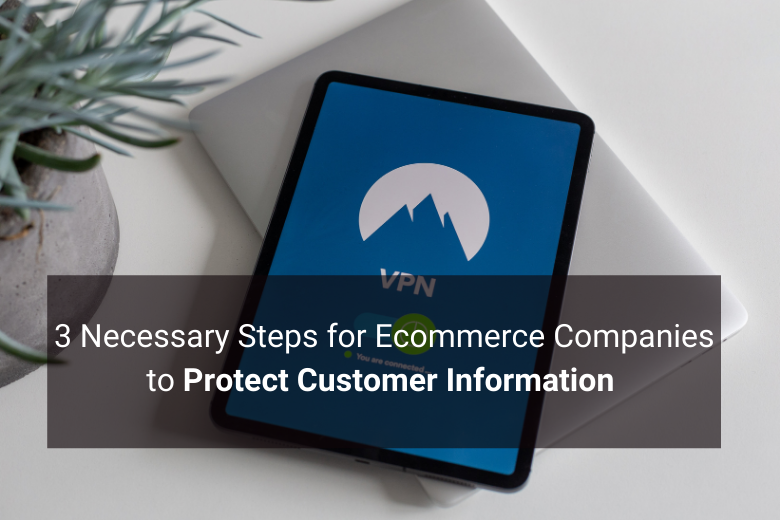Securing various company data types has gotten very tricky in recent years. Especially now that cloud computing is universally embraced. However, it’s still crucial that every company, whether large or small, ensures the right cybersecurity strategies.
Securing sensitive customer information is not just important but vital to a company’s continued existence. This is doubly true for ecommerce companies, who collect a lot of customer data. Some of which, like credit card information, is the type of data that every hacker dreams of collecting.
Why Should Data Security Always Be a Priority?
Being vigilant is crucial because attacks can occur at any time and on any day. There’s no way to anticipate a data breach, ransomware attack, or any other sort of attack. However, ecommerce companies can still prepare for them.
Cyberattacks can cause a great deal of harm to any company, especially to an ecommerce company that functions online. It means they need to put a lot of trust in their systems to ensure they can continue working properly. The much bigger concern, however, is client trust.
If a brick and mortar retailer has a data breach, few people (if any) are going to care very much. But if an ecommerce store has a data breach, that affects the customer directly as a lot of their sensitive data could be at risk. Not only does it damage the company’s reputation with current customers, but it makes them look untrustworthy to any potential ones too.
So any cyber attack can have a massive influence on the company’s bottom line. In fact, 60% of small businesses close after a data breach. Things might be a little better for larger companies, but they still take a big knock to their bottom line.
Ecommerce websites and company servers both need to be guarded against many insidious attacks. It’s pretty much impossible to detail every potential type of attack. Every ecommerce company will have a different situation. The vulnerabilities each company has will depend on the CMS they use, how they set up their website, their extensions, and the type of server-setup they have.

The Most Common Types of Cyber Threats Ecommerce Companies Face
There are some common external and insider threats that every single ecommerce company needs to look out for. Here are some of them:
SQL Injection Attacks: A lot of the recent data breaches are the result of SQL injections. This type of attack gives hackers access to any data sent from company servers to the application they target. By intercepting the data flow, they get to see and store any data the application can access, including user data.
SSL Stripping Attacks: It is called an SSL Downgrade attack. This is when a hacker intercepts the connection between a user and the website they’re visiting. They forward the user’s request to the website or application and receive the secure HTTPS page back. They then downgrade the protocol to HTTP and send the page to the user who is none the wiser. Any information a user sends to the website is then open in plain view for the attacker.
Tracking Data and Enforcing Policies: One of the most important things that companies tend to forget about is how to monitor and enforce data management. There’s a general lack of awareness about where data resides and where it’s moving. This can lead to significant issues. The company may have stringent protections in place server-side but lose all control once the data leaves the server.
Educating Users About Keeping Their Data Safe: Data security is not just in the company’s hands or its employees (though they play a critical part). Users need to know what steps they should take to interact with the ecommerce store safely, and unfortunately, most don’t. So it’s
usually a good idea to inform them in some way, whether via pop-ups on the website, newsletters, or social media.

Implement These Measures to Stay Secure Against Cyberattacks
Keep Those Passwords Safe!
Passwords are – and always will be – a big part of how people keep outsiders out of their accounts and internal systems. That means they are still the most crucial security element to focus on, both for employees and customers.
Naturally, strong password policies should be introduced and enforced. This includes detailing what strong passwords look like and how they should be kept safe. It’s best to follow the “https://www.business2community.com/cybersecurity/password-security-best-practices-in-2020-02282074″current password best practices. Also, make sure to include a form of two-factor authentication (2FA) for employees and website users alike.
Limit Access to Information
Most administrators should have heard about the least privilege rule at some point or another, and it’s crucial they take a second look at it. The rule states that people should only have access to information that they need. This includes error messages and goes doubly for sensitive customer information – lest the company ends up with a full-blown Twitter-like scandal.
Use Strong Firewall and Antivirus Programs
It’s more than likely that almost everyone knows they should be using a strong anti-virus program by now. But a lot of people aren’t aware of how essential firewalls are too. So make sure to get both (from reputable sources) and keep them updated.
Implement Mandatory VPN Usage
Most companies have remote workers in some capacity these days. With ecommerce companies, the likelihood of remote employees is even higher. Several security concerns come with that, not the least of which is network security. Hackers can take advantage of many vulnerabilities in the unsecured networks people use at home or in coffee shops, for instance. Using a virtual private network (VPN) is the only way to keep any transit data safe.
What is a VPN? It acts as a go-between when a person tries to connect to a website. The VPN will encrypt the connection first, route it through its servers to anonymize it, and then send it on to its destination. This makes it harder for outsiders to intercept a connection and prevents them from reading any data being sent or received. It’s also an excellent solution for SSL stripping attacks. Companies can manage their VPN – which requires dedicated management – or use a cloud VPN service.
Also, as stated above, more and more remote workers choose cafes as the place where they work. This might sound like a nice idea at first, but public Wi-Fi can be dangerous. According to statistics, 15.1 billion records were exposed in 2019, and there is a chance that these numbers will keep rising. This shows just how risky it is to ignore cybersecurity tools. For example, a VPN is very straight-forward to use, so it’s easier than ever to protect yourself from hackers.
Cybersecurity has so many benefits for ecommerce companies. Speaking from a financial point of view, the average cost of a data breach is $3.86 million. It’s safe to say that no company
wants to experience that risk. Yet, it’s possible to protect yourself from that scenario. Don’t forget to use a VPN while working with sensitive data and secure your internet connection at all times.
Conclusion
Customer data and company intellectual property are both invaluable assets that have to be protected at all costs. Protecting passwords, encrypting data, and training employees in security best practices may be costly, but it will save an ecommerce company a whole lot more in the long run.
Online safety is more important than ever, but your ecommerce company can protect itself with the help of various cybersecurity tools. Don’t forget to install a strong firewall and use a high-quality VPN to secure your internet connection. This will ensure that your business is as safe as possible.

Ready To Upgrade Your Logistic Solution?
Speak to Floship ecommerce logistic consultant about improving your global support chain today




